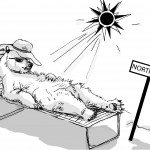
By Jessica Mitchell
With spring in full swing and having just wrapped up what some climatologists call the year without a winter, many people are unsure of the repercussions that this record-breaking weather will have on our world and its inhabitants. Many are also pinpointing global warming as a major contributing factor.
The New York Times reported on March 22 that 4,412 record highs were set in a single week this year. Nature and weather’s instability has caused the Midwest to experience a spring-like winter and, so far, a summer-like spring. The unusually warm weather has caused plants, animals and bugs to wake up earlier than normal, which can potentially have negative ramifications if weather were to change and turn cold.
“It hasn’t stayed cold long enough to really discourage things like mosquito development,” said Kim Criner, student Sustainability affairs coordinator. “So, we are probably going to have a much longer mosquito season just because it’s going to be warmer longer. Also, the plants have started to think it’s springtime. If we do get another freeze we can end up setting them back in their bloom cycles and things like that in terms of agriculture and even tree buds.”
While there are many negative outcomes of unseasonable weather, many people have favored our lack of winter and prefer it to the snow and harsh conditions to which we have grown accustomed.
“I can imagine that our warm winter would have some negative outcomes but I’d take 60’s and sunny over black ice and power outages any day,” said Michael Stephens, student. “I think I’ve made my peace with global warming.”
Having just wrapped up such a mild winter, global warming has become a topic of discussion and many people wonder if it is to blame and if we are seeing its effects.
“I am completely convinced that the globe is in fact warming due to anthropogenic causes,” said Jay Antle, history professor and executive director of Sustainability. “Having said that, I think it is very difficult to draw a connection between any single weather event and what’s happening in terms of overall gradual increase in global temperature.”
Even though the warm winter was something we grew accustomed to this year, it was not a landmark or permanent event. We will still have extremely cold winters and we will still wake up to an abundance of snow and ice. This winter was just unseasonable.
“The climate is basically trying to balance itself out,” Criner said. “The norms we have become used to are becoming disrupted due to changes in our atmosphere content by the burning of fossil fuels and things like that. So, we are going to have a really cold winter again. It’s not going to continue to get warmer and warmer. When we talk about global temperatures warming, we’re talking about only a few degrees, but that’s enough to often set things out of usual sync.”
When the term “global warming” is thrown around in conversation, many people draw parallels to a never-ending summer and a desert like existence. However, while us Midwesterners were experiencing the warming part of global warming, our distant neighbors in Europe were experiencing the cooling part of global warming.
“The rules we have been used to for hundreds of years now are increasingly uncertain and so rather than use the term ‘global warming,’ although the globe is warming, ‘climate destabilization’ makes a little more sense,” Antle said. “Extreme events are going to become more common, whether it be drought, flood, warm summer, cold summer, warm winter, cold winter – the unusual will become more usual. That seems to be what’s happening to the global climate.”
Contact Jessica Mitchell, features editor, at [email protected].





















